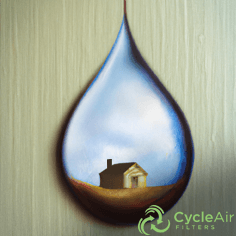
Is Your Home's Indoor Humidity Contributing to Unhealthy Air?
| Scott C
Indoor air quality is an important aspect of maintaining a healthy and comfortable home. One important aspect of indoor air quality is humidity. Humidity refers to the amount of water vapor in the air, and it can have a significant impact on our comfort and health. In this blog post, we will take a closer look at optimal humidity levels and how the HVAC (Heating, Ventilation, and Air Conditioning) system contributes to maintaining them.
Humidity levels that are too high or too low can have negative impacts on our health and comfort. High humidity levels can lead to the growth of mold and mildew, which can trigger allergies and asthma. High humidity can also make the air feel warmer, leading to discomfort. Low humidity levels can cause dry skin, nosebleeds, and respiratory issues. It can also cause wood furniture and flooring to crack and become brittle.
The optimal humidity level for indoor air is between 30% and 50%. This level is considered comfortable and safe for most people and can reduce the risk of mold and mildew growth.
The HVAC system plays an important role in maintaining optimal humidity levels in the home. The system is designed to control the temperature, ventilation, and humidity of the air. Many HVAC systems come equipped with a humidifier or dehumidifier that can be used to control humidity levels. A humidifier adds moisture to the air, while a dehumidifier removes moisture from the air. These features help to maintain optimal humidity levels and improve indoor air quality.
It's also important to note that your HVAC system maintenance should include regular cleaning and checking of the filters and ducts. Dust and debris can build up in these areas and can reduce the efficiency of the system and can also cause indoor air pollution.
In addition to maintaining HVAC systems, there are also other things you can do to maintain optimal humidity levels in your home. For example, you can use a hygrometer to monitor humidity levels, and use a humidifier or dehumidifier to adjust the levels as needed. Also, make sure to use exhaust fans in the kitchen and bathroom to help remove moisture and keep the humidity levels in check. Using plants in the house or adding a pebble tray can also help in increasing humidity level naturally.
Maintaining optimal humidity levels is important for indoor air quality and the comfort of your home. By understanding the ideal humidity levels and utilizing your HVAC system, as well as making other small changes such as monitoring humidity levels, you can improve your home's indoor air quality and create a healthier environment for you and your loved ones. Regular maintenance of HVAC system and regular cleaning will also help to keep the system working efficiently and improve indoor air quality.

Leave a comment
Your email address will not be published.